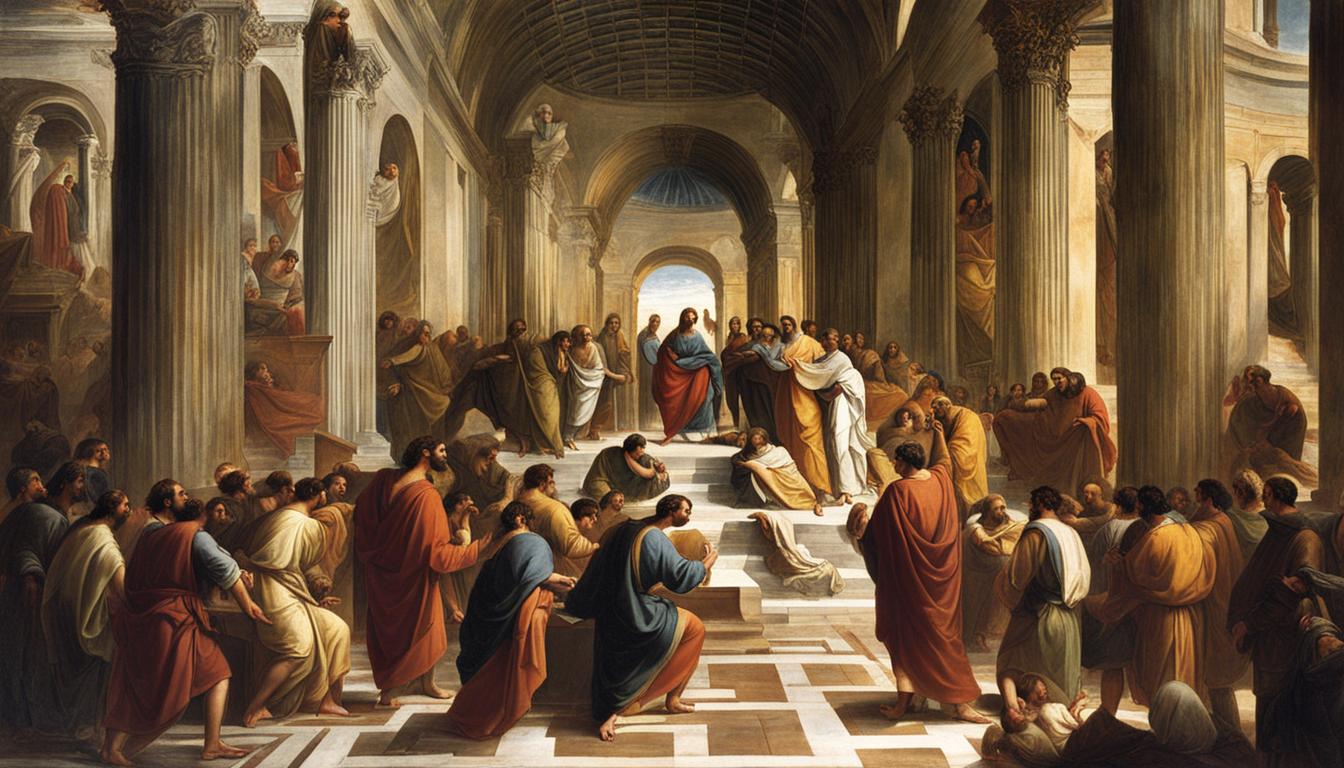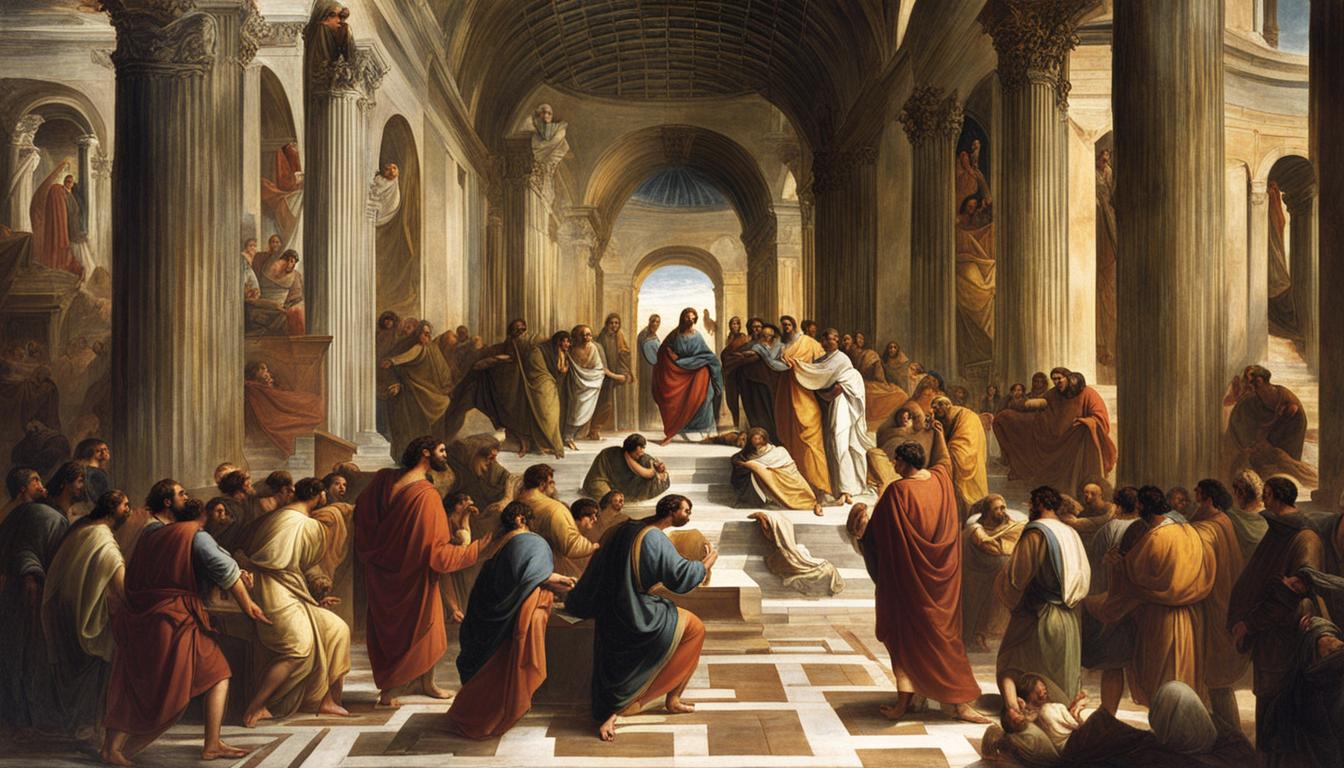The city of Corinth, located in Greece on an isthmus between the Aegean and Ionian Seas, was a prominent center in the first century. It held great commercial and military significance as the capital of the Roman province Achaia. In the midst of this bustling city, the ancient Church in Corinth was born.
The Church in Corinth, also known as the Corinthian Church, was founded by the apostle Paul during his second missionary journey. It was a diverse community, with both Jews and Gentiles coming together in faith. Paul, in his letters to the Corinthians, addressed various issues faced by the church, including division among leaders, immorality, spiritual gifts, and confusion about marriage and the resurrection.
Key Takeaways:
- The Church in Corinth was founded by the apostle Paul during his second missionary journey.
- It consisted of both Jews and Gentiles, creating a diverse community.
- Paul’s letters to the Corinthians address issues such as division among leaders, immorality, spiritual gifts, and confusion about marriage and the resurrection.
- Corinth was a significant city in ancient Greece, known for its commercial and military importance.
- The Church in Corinth remains influential today, reminding believers of the importance of unity, sound doctrine, and obedience to biblical principles.
Origins and Founders of the Church in Corinth
The church in Corinth was founded by the apostle Paul during his second missionary journey. After leaving Athens, Paul arrived in Corinth and met Aquila and Priscilla, with whom he worked as a tentmaker (Acts 18:1-3). Although Paul faced opposition from the unbelieving Jews at the synagogue, he preached there every Sabbath (Acts 18:4). However, due to the resistance he encountered, Paul decided to focus on preaching to the Gentiles (Acts 18:5-6).
Throughout his ministry in Corinth, which lasted approximately a year and a half, Paul remained in contact with the Corinthian church. He continued to provide guidance and address various issues through his letters and personal emissaries. These letters, known as 1 Corinthians and 2 Corinthians, form part of the New Testament and are valuable sources of information about the origins and early years of the church in Corinth.
“I planted, Apollos watered, but God gave the growth.” – 1 Corinthians 3:6
The apostle Paul’s ministry in Corinth played a crucial role in the establishment and growth of the church. His teachings and letters continue to influence Christian doctrine and provide guidance for believers today.
Table: Key Events in the Founding of the Church in Corinth
| Event | Description |
|---|---|
| Arrival in Corinth | Paul arrived in Corinth after leaving Athens and met Aquila and Priscilla. He worked with them as a tentmaker. |
| Preaching in the Synagogue | Paul initially preached in the synagogue every Sabbath but faced opposition from the unbelieving Jews. |
| Focus on Gentile Outreach | Due to the resistance from the unbelieving Jews, Paul decided to focus on preaching to the Gentiles in Corinth. |
| Correspondence and Guidance | Paul remained in contact with the Corinthian church through letters and personal emissaries, providing ongoing guidance and addressing various issues. |
Key Beliefs and Doctrines of the Church in Corinth
The church in Corinth, as highlighted in Paul’s letters, held a range of key beliefs and doctrines. One of the prominent issues addressed in these letters was the division among leaders within the church. Paul emphasizes the importance of unity in Christ, urging the Corinthians to not align themselves with individual leaders but to focus on their shared faith. This belief in unity and the centrality of Christ as the foundation of the church remains relevant and significant today.
Additionally, Paul’s letters discuss various moral and ethical issues that the Corinthian church grappled with. These issues included gross immorality, confusion about marriage and the future resurrection, dietary restrictions, and the use of spiritual gifts. Paul’s teachings emphasize the guiding principle of love in all matters and highlight the importance of using spiritual gifts for the edification and growth of the church.
Furthermore, the Corinthian church, influenced by the culture of the city, had to navigate challenges related to idolatry and societal influences. Paul’s letters provide guidance on how the church should resist and overcome these influences while remaining faithful to their Christian beliefs.
| Key Beliefs and Doctrines | Highlighted Concepts |
|---|---|
| Unity in Christ | Emphasizing the centrality of Christ and discouraging division among leaders. |
| Moral and Ethical Conduct | Addressing issues of immorality, marriage, dietary restrictions, and the use of spiritual gifts. |
| Resistance to Societal Influences | Guidance on overcoming idolatry and remaining faithful in a culture influenced by immoral practices. |
The teachings of Paul to the Corinthian church continue to serve as a foundation for understanding and practicing Christianity today. They provide insights into how believers should navigate moral, ethical, and societal challenges, emphasizing the importance of unity, love, and adherence to biblical principles.
Historical Significance of the Church in Corinth
The church in Corinth holds immense historical significance as it was situated in the ancient Greek city of Corinth, which later became a Roman colony. This city was strategically located on an isthmus between the Aegean and Ionian Seas, making it a prime center for trade and commerce in the first century. Corinth attracted people from various backgrounds and nationalities, resulting in a diverse community within the church.

The historical significance of the church in Corinth lies not only in its location but also in the cultural context it existed in. The city of Corinth was known for its prosperity, art, and architecture, but it was also infamous for its immorality and idolatry. These societal influences and challenges deeply impacted the Corinthian church and the issues it faced.
Furthermore, the prominence of the church in Corinth can be attributed to its connection with the apostle Paul. Paul established the church during his second missionary journey and maintained a strong bond with the Corinthian believers through his letters. These letters, known as First and Second Corinthians, form a crucial part of the New Testament and provide insights into the challenges faced by the early church and the teachings of Paul to address them.
| Key Points | Details |
|---|---|
| Ancient Greek city | Corinth was a prominent city in ancient Greece, known for its commercial and military significance. |
| Roman colony | After being destroyed by the Romans, Corinth was rebuilt as a Roman colony under Julius Caesar. |
| Prosperity and trade | Corinth attracted people from various backgrounds due to its prosperity and role in trade and commerce. |
| Societal influences | Corinth was known for its immorality and idolatry, which had an impact on the challenges faced by the Corinthian church. |
| Connection with Apostle Paul | Paul founded the church in Corinth and maintained a strong bond with the believers through his letters. |
Denominational Split or Schisms in the Church in Corinth
The church in Corinth faced significant challenges in terms of denominational split and schisms. As mentioned earlier, the Corinthian church struggled with division and loyalty to different leaders. These divisions hindered the unity and effectiveness of the church, creating an environment of strife and discord.
Paul, in his letters to the Corinthians, addressed these issues head-on. He emphasized the importance of Christ as the focal point for unity, urging the members to focus on Him rather than individual leaders. In 1 Corinthians 1:10, Paul writes, “I appeal to you, brothers and sisters, in the name of our Lord Jesus Christ, that all of you agree with one another in what you say and that there be no divisions among you, but that you be perfectly united in mind and thought.”
Paul’s admonition highlights the detrimental effects of denominational split and schisms in the Corinthian church. He stressed the need for unity, recognizing that such factions undermine the purpose and mission of the church. By urging the members to fix their eyes on Christ, Paul aimed to redirect their focus from divisive human leaders to the unifying power of the gospel.
Leadership and Governance of the Church in Corinth
The leadership and governance of the church in Corinth played a crucial role in addressing the various challenges faced by the congregation. In his letters to the Corinthians, the apostle Paul provided guidance and instructions to the leaders on matters of authority, discipline, and unity. Paul’s authority as an apostle of Christ was questioned by some members of the church, prompting him to defend his character and ministry.
Paul emphasized the importance of unity and urged the church members to avoid aligning themselves with different leaders and factions. He reminded the Corinthians that they were all part of the body of Christ, with Christ Himself as the head. This emphasis on Christ as the central figure and ultimate authority in the church aimed to mitigate divisions and promote a unified church community.
Paul’s Instructions on Church Discipline and Disagreements
“If any man thinks himself to be a prophet or spiritual, let him acknowledge that the things which I write unto you are the commandments of the Lord.” – 1 Corinthians 14:37
Paul provided specific instructions on how to handle disciplinary issues within the church and how to address disagreements among believers. He emphasized the importance of conducting discipline in a spirit of restoration and love, rather than punishment. Paul also emphasized the need for order in worship services and the proper use of spiritual gifts for the edification of the church.
Although the exact structure of leadership in the Corinthian church is not explicitly mentioned in the biblical text, Paul’s letters provide valuable insights into the principles of leadership and governance. These teachings continue to be relevant for the modern church, serving as a guide for leaders in navigating various challenges and promoting a healthy and unified church body.
| Leadership and Governance | Key Points |
|---|---|
| Authority of Paul | – Paul defends his authority as an apostle of Christ – Emphasis on Christ as the ultimate authority |
| Unity and Avoiding Factions | – Corinthians urged to avoid aligning with different leaders – Emphasis on Christ as the head of the church |
| Discipline and Disagreements | – Instructions on conducting discipline with love and restoration – Emphasis on order in worship services |
| Principles for Leaders | – Paul’s letters provide guidance for leaders in the absence of explicit structural details |
Worship Practices in the Church in Corinth
The church in Corinth, like many early Christian communities, had unique worship practices that reflected the cultural context and challenges they faced. Paul’s letters to the Corinthians address several important aspects of their worship, including the observance of the Lord’s Supper and the use of spiritual gifts.
In regard to the Lord’s Supper, Paul confronts the Corinthians’ improper behavior during the sacrament. He reminds them of the significance of the bread and wine, which symbolize the body and blood of Christ. Paul emphasizes the need for unity and reverence during this sacred act of remembrance and communion.

The church in Corinth was also known for its enthusiastic use of spiritual gifts. However, Paul addresses the need for order and edification within the worship gatherings. He encourages the Corinthians to exercise their gifts primarily for the building up of the entire community, rather than for personal recognition or self-gratification.
The Lord’s Supper in the Church in Corinth
Paul’s letter to the Corinthians provides insight into the improper behavior that had become prevalent during the observance of the Lord’s Supper. He reminds the Corinthians of the true significance of this sacrament and urges them to examine themselves before partaking. Paul emphasizes the need for unity and self-examination, warning against the consequences of partaking in an unworthy manner.
“For as often as you eat this bread and drink the cup, you proclaim the Lord’s death until he comes.” – 1 Corinthians 11:26
Spiritual Gifts in the Church in Corinth
The Corinthians were enthusiastic about the manifestations of spiritual gifts, but Paul provides guidance on their proper use within the worship gatherings. He highlights the importance of love as the motivating factor behind the exercise of these gifts and emphasizes the need for orderly and edifying worship services.
“But all things should be done decently and in order.” – 1 Corinthians 14:40
The worship practices in the church in Corinth serve as a reminder of the importance of reverence, unity, and the edification of the body of believers. They also highlight the need for a careful and intentional approach to the observance of the Lord’s Supper and the exercise of spiritual gifts within the context of corporate worship.
Contemporary Influence of the Church in Corinth
The church in Corinth, despite its challenges and shortcomings, continues to exert a significant influence in the contemporary Christian world. The teachings and insights found in Paul’s letters to the Corinthians remain relevant and applicable to believers today. These letters provide guidance on issues such as division, immorality, spiritual gifts, and the impact of societal influences. By studying the experiences and lessons of the early Corinthian church, modern Christians can gain valuable insights into maintaining unity, adhering to sound doctrine, and navigating the complexities of a changing world.
One of the key aspects of the contemporary influence of the church in Corinth is its emphasis on unity. The Corinthian church witnessed divisions and schisms, with members aligning themselves with different leaders. Paul’s letters emphasize the centrality of Christ and the importance of focusing on Him rather than individual leaders. This message of unity and oneness in Christ continues to resonate with believers today, reminding them to prioritize love, reconciliation, and cooperation within the body of Christ.
Furthermore, the relevance of Paul’s letters to the Corinthians extends to addressing moral and ethical issues that are prevalent in today’s society. The Corinthian church struggled with issues such as sexual immorality, idolatry, and misuse of spiritual gifts. Paul’s teachings serve as a timeless reminder of the importance of holiness, purity, and living according to biblical principles in a world that often promotes values contrary to the Gospel.
The contemporary influence of the church in Corinth is also seen in its teachings on worship practices. The Corinthian church grappled with disorder and confusion during their gatherings, particularly in the observance of the Lord’s Supper and the use of spiritual gifts. Paul’s instructions provide valuable insights into the importance of order, reverence, and edification in worship, guiding modern believers in their pursuit of authentic and God-honoring worship.
| Contemporary Influence of the Church in Corinth | |
|---|---|
| Teachings on Unity | The church in Corinth teaches the importance of unity, emphasizing the centrality of Christ and the need to prioritize love and reconciliation within the body of Christ. |
| Moral and Ethical Guidance | The teachings of the Corinthians address prevalent moral and ethical issues such as sexual immorality, idolatry, and misuse of spiritual gifts, providing guidance for believers in living according to biblical principles. |
| Worship Practices | The Corinthian church’s teachings on worship practices provide insights into the importance of order, reverence, and edification in contemporary worship gatherings. |
In conclusion, the church in Corinth continues to exert a contemporary influence through its teachings and experiences. The lessons learned from the challenges faced by the Corinthian church serve as a valuable guide for modern believers, reminding them of the ongoing need for unity, adherence to biblical principles, and discernment in the face of societal influences. By studying the teachings of Paul’s letters to the Corinthians, believers can deepen their understanding of God’s timeless Word and apply its truths to their lives and the life of the church.
Current World Membership Number and Percentage of World Religions of the Church in Corinth
The current world membership number and percentage of the church in Corinth are difficult to determine as the church today is officially under the Church of Greece, part of the Greek Orthodox Church. There is also a small evangelical presence in Greece, but its size and influence may be limited compared to other denominations and religions.
| Religion | World Membership Number | Percentage of World Religions |
|---|---|---|
| Christianity | N/A | N/A |
| Islam | N/A | N/A |
| Hinduism | N/A | N/A |
| Buddhism | N/A | N/A |
| Judaism | N/A | N/A |
| Other religions | N/A | N/A |
Note: The numbers and percentages provided here are not available due to the lack of specific data on the current world membership of the church in Corinth. These figures are subject to change and may vary depending on various sources and methodologies used for measurement.
While it is challenging to determine the precise current world membership and percentage of world religions of the church in Corinth, it is important to consider the historical significance and timeless lessons that the church embodies. The impact of the church in Corinth extends beyond membership numbers and percentages, as its teachings and challenges continue to provide valuable insights for the broader Christian community.
Conclusion
The church in Corinth holds significant historical and biblical significance as a prominent early Christian church.
Its challenges and lessons continue to resonate with the modern church, reminding believers of the importance of unity, love, sound doctrine, and obedience to biblical principles.
The influence of the Corinthian church and the teachings of Paul have shaped the understanding and practice of Christianity today.
FAQ
What is the church in Corinth?
The church in Corinth refers to the ancient Christian church founded by the apostle Paul in the first century in the city of Corinth, Greece.
Who founded the church in Corinth?
The church in Corinth was founded by the apostle Paul during his second missionary journey.
What issues did Paul address in his letters to the Corinthians?
Paul addressed issues such as division among leaders, gross immorality, misuse of spiritual gifts, and confusion about marriage and the future resurrection.
What was the historical significance of the church in Corinth?
The church in Corinth was significant both historically and culturally as it was located in an ancient Greek city known for its prosperity, trade, and art.
What challenges did the church in Corinth face?
The church in Corinth faced challenges such as denominational split and schisms, divisions among leaders, and issues related to worship practices and immorality.
What did Paul address regarding the leadership and governance of the church in Corinth?
Paul provided guidance on issues related to his authority, church discipline, handling disagreements, and the proper exercise of spiritual gifts.
What were the worship practices like in the church in Corinth?
The worship practices in the church in Corinth were marred by abuses and misunderstandings, including issues with the observance of the Lord’s Supper and the use of spiritual gifts.
Why is the church in Corinth still relevant today?
The challenges faced by the Corinthian church, as addressed by Paul, continue to resonate with the modern church, reminding believers of the importance of unity, love, doctrine, and obedience.
What is the current world membership of the church in Corinth?
The exact current world membership and percentage of the church in Corinth are difficult to determine as it is officially under the Church of Greece, part of the Greek Orthodox Church.
What is the significance and lessons of the church in Corinth?
The church in Corinth holds historic and biblical significance, with its challenges and lessons shaping the understanding and practice of Christianity today.
















